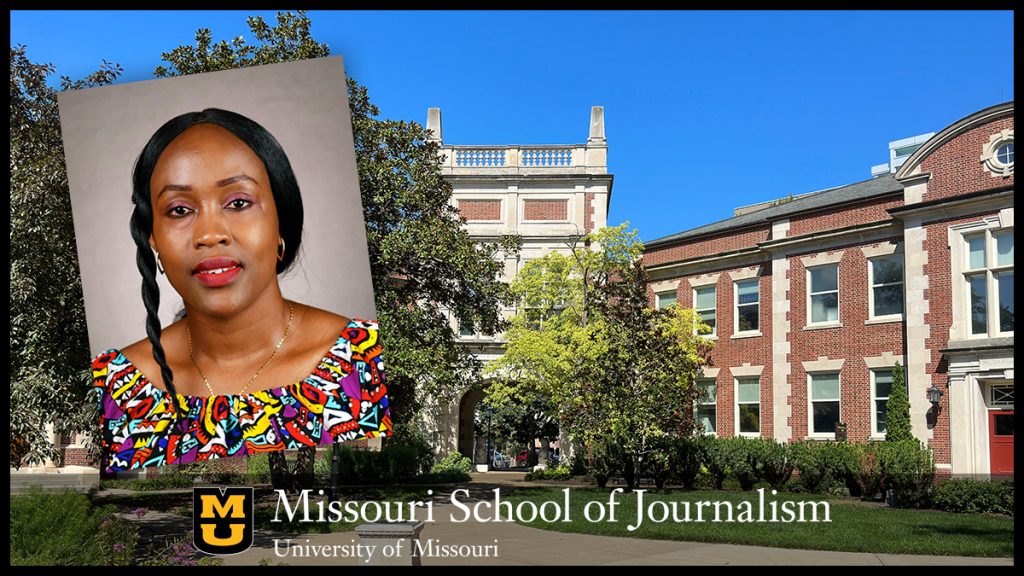From the streets of Kenya to Missouri School of Journalism grad student

COLUMBIA, Mo. (July 31, 2024) — When Teresia Nzau, a doctoral student at the Missouri School of Journalism, learned that she had won the 2024 Inez Kaiser Graduate Students of Color Award from the Association for Education in Journalism and Mass Communication (AEJMC), the news resonated with her on a number of levels.
Not only had she been recognized for her research, which generally takes a globally informed approach to crisis communication, but the award’s namesake — Inez Kaiser, the first Black woman to lead a PR company with national clients — was an acknowledgment of some of the struggles Nzau had faced in becoming a journalist and academic researcher.
Kaiser pioneered a path forward for minority women in an era of racial strife and segregation. Nzau had her own challenges borne from social dynamics during her upbringing in Kenya, in a society she said did not encourage her to pursue an ambitious career the way it did for boys and men.
“A lot of emphasis is given to the boy child, where the boy will go and compete with the men in some big field, but the woman will get married, she will have kids,” Nzau said. “So this award means a lot to me because Inez broke barriers not just as a woman of color, but as a woman with brains.”
Nzau accumulated well over a decade of broadcast media experience in her home country before coming to Mizzou and earned her bachelor’s degree from Kenya’s Daystar University in 2016, but it was at the School of Journalism that she found the competitive opportunities she had been striving for.
“Where I come from, by the time people have graduated from universities, most of them have not published anything,” Nzau said. “Coming to the University of Missouri has really opened my academic world: I’ve published three articles in well-known journals, I have two book chapters and I have some manuscripts in progress. I’m in a competitive place.”
That’s an assessment backed up by Earnest Perry, associate dean for graduate studies and research at the School of Journalism.
A lot of emphasis is given to the boy child, where the boy will go and compete with the men in some big field, but the woman will get married, she will have kids. So this award means a lot to me because Inez broke barriers not just as a woman of color, but as a woman with brains.
Teresia Nzau
“Terry is an amazing young scholar who earned this award through her hard work and dedication,” Perry said. “Her research is informed by her experiences both in the profession and in life. She is passionate about the work and we are excited to help her achieve her dreams.”
There was a time, though, when earning an award for academic research might have seemed impossible to Nzau. Both of her parents died while she was in elementary school, and after she and her three siblings endured abuse from their subsequent guardians, they became homeless.
“We had to drop school because we didn’t have anyone to pay school fees for us, and education in Kenya is very expensive,” Nzau said.
After a chance encounter in the street with one Charles Mulli, the family found a haven in Mully Children’s Family (MCF), an organization founded by Mulli that assists disadvantaged children in Kenya. But even that turn of events came with a wrenching caveat: her youngest sister, still an infant, was too young to be cared for at MCF, forcing the family to split up.
Despite everything, Nzau now had food and shelter, and she set her mind to fulfilling a dream than began with a childhood interest in becoming a weather forecaster and morphed, with time and exposure to music and drama festivals at school, into a desire to tell stories. Emulating the manner and ethics of Christiane Amanpour, the renowned international journalist and host for CNN, she would pretend to do news readings at school.
Now, as a doctoral student, that clear-eyed focus on her future makes a deep impression on those she works with and learns from, including Associate Professor Yong Volz, co-chair of Nzau’s dissertation committee.
“I’ve met so many doctoral students, but she is a little bit different,” Volz said, noting that she was in Nzau’s shoes more than two decades ago as an international student. “She is so sure about what she wants to accomplish. Nothing can stop her. And she is so proud of her cultural background — she doesn’t shy away from her roots.”
Indeed, even as an award-winning researcher, Nzau’s background continues to inform her work. Her dissertation focuses on the concept of silence in crisis communication, taking inspiration from what she describes as a Kenyan proclivity for responding to crises not with knee-jerk reactions but with time, patience and the recognition that “silence” as a communication concept can take many different forms.
“I’m bringing a new perspective where we balance when to talk and when to keep quiet,” Nzau said. “When something happens that touches peoples’ emotions, do we just go on speaking? If there is an incident that involves a death, should we give the grieving family time to speak? Sometimes, we need to give people space.”
Nzau will present her work at the upcoming AEJMC Conference, which is running Aug. 8-11.
Updated: July 31, 2024